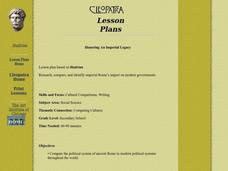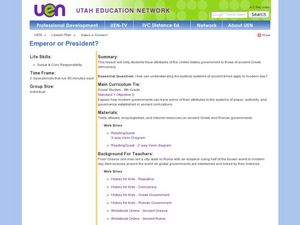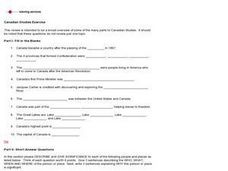Curated OER
Rome's Rise To Power: The Republic
Students investigate the government structure of ancient Rome. In this government systems lesson, students compare and contrast the government of ancient Rome with the government of the United States.
Curated OER
An Interview With the Past: Ancient Roman and U.S. Government Leaders
Students produce a modern television interview show where they present information about Ancient Rome and its influence on modern governments. In this governments lesson plan, students produce shows in groups.
Curated OER
To Be or Not to Be Democratic
Seventh graders explore the democratic republic principles of U.S. government. In this U.S. government lesson, 7th graders compare and contrast the governments of ancient Athens,the Roman Republic, and the United States today. Students...
Curated OER
The Republic; Roman History, Democracy
Students explain the ways in which current American system of government both resembles and differs from the system of government in Rome form about 510 to 264 B.C.
Curated OER
Democracy: An Introduction.
Students study the U.S. Constitutional System and how it compares with forms of democracy that developed in ancient Greece and Rome. They list and explain the requirements it takes to form a society to be considered a nation.
Curated OER
Honoring An Imperial Legacy
Students research, compare, and identify imperial Rome's impact on modern governments. They compare the political system of ancient Rome to modern political systems throughout the world.
Curated OER
Unity Versus Diversity
Young scholars explore the 50 State Quarters program and how it represents diversity and unity of the United States. In pairs, they examine quarter designs to gain information about the culture of each state. Students create charts to...
Curated OER
What's Rome Got to Do With it?
Sixth graders examine the government of ancient Rome as well as their home country. They discover the basic structure of the government of Rome, their country, and another country.
Curated OER
Rome: Republic to Empire
Sixth graders discuss the rise of Rome from a republic to a dictatorship. In small groups, they role-play as congress people debating whether or not to give the president more powers. In another activity, 6th graders produce television...
Curated OER
The Philippines-U.S. Involvement
Young scholars research and discuss the rational for U.S. involvement in the Philippines. They discuss overall foreign and domestic policies of the U.S. Then they create a timeline that highlights this impact.
Museum of Tolerance
The Role of Citizens in a Participatory Democracy
Groups research participatory democracies and compare the role and rights of citizens in ancient history with those in recent U.S. history. Guided by a series of questions, individuals compose a persuasive essay in which they discuss the...
Curated OER
Emperor or President?
Sixth graders complete a Venn Diagram. In this government comparison lesson plan, 6th graders discuss how rules are similar and different at home, school and in their community. Students learn about the type and structure of the United...
Curated OER
Introducing Elections Unit
Students discover the political parties of our country by participating in a role playing activity. In this U.S. Government instructional activity, students visit several different classrooms that each represent one of the political...
Curated OER
Who are American Citizens?
Students investigate American citizenship. In this civics lesson plan, students consider the basic knowledge of U. S. government new citizens are required to have. Students also examine the 14th amendment that describes U. S. citizenship.
Curated OER
A Nation's Voice
Students research the Constitution and the War Powers Act in order to determine what the powers of the government are in times of conflict. They answer a series of questions then write a legal brief either supporting or condemning the...
Curated OER
Putting a Spin on Current Events
Pupils explore the artistic value of propaganda. In this visual arts lesson, students analyze antique artistic pieces for their political agenda perpetuation. Pupils discuss propaganda techniques of the past to today prior to designing...
Curated OER
Resolving Kennedy's Legacy
Eleventh graders investigate the medical condition that plagued John F. Kennedy throughout his life. In this US History lesson, 11th graders read and analyze uncovered documents in relation to Kennedy. Students write a report on John...
Curated OER
Geometry of Democracy
Students explore the architecture of New England by identifying geometric shapes. In this architectural activity, students examine photographs of classic building architecture and use a transparency to trace geometric shapes they...
Curated OER
Canadian Studies Exercise
In this Canadian history worksheet, 6th graders review many aspects of Canadian studies. Students complete 10 fill in the blank questions, 5 essay questions and 10 true/false questions.
Curated OER
The Glorious Revolution, the American Revolution, and the French Revolution
Students relate the Glorious Revolution, the American Revolution, and the French Revolution through web based research and scenarios.
Curated OER
Mineral Munch
Second graders explore the sodium content in foods they eat. After observing a table setting, 2nd graders then identify items made from rock. They taste low sodium crackers and compare them to regular crackers. Students discuss the...
iCivics
I Civics: Cradle of Democracy Mini Lesson
No one person invented the kind of government that we have in the U.S. Check out two early governments that inspired the system that we have today: Athenian democracy, and the Roman Republic.
The Dirksen Congressional Center
Congress Link: Lesson Plans
The Dirksen Congressional Center provides abundant lesson plans on all aspects of the US Congress and the US Constitution. All lessons contain time frames, objectives, and links to material, and are built around Bloom's taxonomy.























